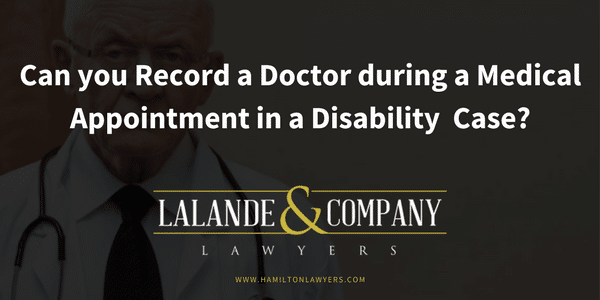By Matt Lalande in Articles on April 16, 2018

6 Minute Read
It’s understandable that recording doctor visits can help vulnerable or ill patients remember their doctor’s instructions, suggestions, treatment details, medication, diagnosis ect. – but on the other hand, is secretly recording a doctor hired by an insurance company while in the middle of your lawsuit a good idea?
In Canada, it’s perfectly legal to record a conversation that you are a part of without the other person knowing. Technically, it’s s only illegal to intercept a private conversation. The situation is different, however, if you are involved in a legal dispute. Before recording any type of medical visit you need to request permission from a Judge, who has the authority to determine any dispute or question regarding scope of medical assessments conducted for the purpose of litigation. The court has jurisdiction to set terms and conditions relating to an examination including a condition relating to the recording of the examination.
Take for example a recent decision where a plaintiff that was fighting a disability denial asked a Judge that she be allowed to audio record a Doctor that Sunlife was asking her to see.
Lipovetsky v. Sun Life Assurance Company Canada is a case about a lady that sued Sunlife for denied disability benefits. she argued that she was forced to stop working in April of 2011 because she suffered from severe anxiety, depression, bipolar disorder (II) and borderline personality disorder. She suffered from persistent emotional dysregulation, becomes easily overwhelmed, was vulnerable to stress and had difficulty adjusting to stressful situations. Sunlife set up a “medical exam” with one of their paid insurance doctors who did not want any friends, family, personal health care aides, etc. to be present during his medical examination.
To rebut a plaintiff’s claims of disability, the disability insurance company is entitled to have you examined by a physician of its choosing.
Ms. Lipovetsky asked the court asked permission a friend attend the medical appoint with her for support, and to audio record the insurance company doctor. The Judge gave permission to have the friend attend, but denied the request to audio record the doctor.
Twenty-six years ago, in 1992 (before you had an iphone!) the Ontario Court of Appeal considered this issue of audio recording a defence medical examination, in a case called Bellamy v. Johnson. The case set out the ground rules for recording a doctor in a personal injury case. IN that case, the Court supported the recording of an insurance company orthopedic surgeon.
The Court revisited the issue in 2010 in a case called Adams vs Cook, (after our rules governing the procedures of law changed) and addressed the issue of audio recording an independent medical assessment. There, the Court held that there was no general right to record such examinations.
Over the years there have been various decisions for and against the recording of doctors during medical examinations, including this recent case denying the plaintiff permission to record the medical examination. What we do know is that each application to permit tape-recording during an examination will not only depend on its own facts, but the you need to have a substantial and compelling reason to ask for an Court Order to permit the recording of your examination.
For example, can you show that the doctor that is set to examine you is highly biased? If so, a court may allow you to record the medical legal appointment with the insurance disability doctor. Remember thought – general bias of the insurance industry, or of the doctor, for example, will normally not be enough.
You need to show actual bias on the part of the defence examiner – and if you do allege bias, you need specific good reasons that support your allegations. You need a show a bona fide concern as to the reliability of the doctor’s lack of impartiality. You need to show a Court that the doctor that is going to examine you has had report or evidence rejected by judges and arbitrators – some repeatedly – for being inaccurate, unfairly biased against the injured person, or written by someone else.
Otherwise, unfortunately, you will need to leave your iphone in the car.
From a claimant perspective, we need to remember that all doctors, whether hired by the claimant’s lawyers or an insurance company, need to be absolutely independent and impartial. If a doctor agrees to clinically examine a disability claimant in exchange for payment, there is no doubt that the doctor agrees to demonstrate objectivity throughout the examination process. If there is such an agreement (there is a signed agreement in Ontario) to be impartial, then should why would there be an issue demonstrating objectivity in a recorded environment, especially if the recordings are ordered to be being fully circulated, unedited and in full? Should we not be able to secure an accurate record of what transpired at the impartial defence medical examination?
Just as defendants often try to use secret video recordings of unsuspecting plaintiffs and their families engaging in activities which they claim their injuries restrict, in fairness, disability claimants should be afforded the same opportunity when it comes to challenging the weight of the opinions offered by defendants’ examining doctors at trial. Whether the expert’s interview was acceptable or not can be tested by cross-examination.
But unfortunately, this is not how things work. Ontario is not a victim friendly province. More often than not, you won’t be permitted to record the doctor unless the doctor has a reputation for being highly bias, and, the recording will go nowhere except for arguments for a mistrial.
The answer is probably not.
If you have any questions about recording your doctors during and examination, please contact our Hamilton disability insurance lawyers at (905)333-8888 or fill in a contact form and we will be happy to get back to you.